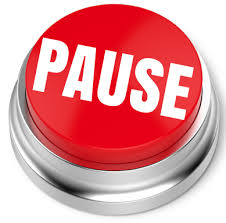The summary of our coaching work told a powerful, yet simple, story. “Scott, the biggest impact our time had was to take a deep breath when things got heated and keep my emotions more level so the conversation could continue towards a mutually agreed upon solution.” Breath = Pause. What situations do you get in where your emotion takes over and the pause button is needed for you to effectively manage your contribution to the conversation?
- Parenting?
- Home improvement project with your spouse?
- Summer canoe trip where you are NOT in the back steering?
- Riding a tandem bicycle where you ARE in the back and not steering?
The brain is actually wired to react first and think secondly; it is called the amygdala, which is at the base of the brain and controls the fight/flight response. It is supposed to kick in to keep you alive. When humans lived in caves and were outnumbered by animals big enough to eat them, it was critical for survival. Since we have moved into dwellings with locks and walls and work in offices, it is not as critical, but it is still there.
Seth Godin calls the amygdala the lizard brain, and says this in his book Linchpin:
The lizard brain is here to keep you alive, the rest of your brain merely makes you a happy, successful, connected member of society.
People-centered leaders still speak up and disagree, and the reason for having meetings with agendas and frequent one-on-ones with their people is to create space where disagreements can happen and be managed.
Here are two tips for practicing the pause:
- Bring water to the meeting and drink when you get irritated or feel the need to offer a quick rebuttle to a comment.
- Commit to using the comment “Tell me a little more about that?” at least once in your next meeting.
Where can you practice the pause today? When you practice the pause, how effective are you at restarting the conversation and channeling that emotion into a better solution to the issue you are addressing? When you fail at the pause, how quickly do you apologize and restart?
Listen . . Lead. Repeat often!

